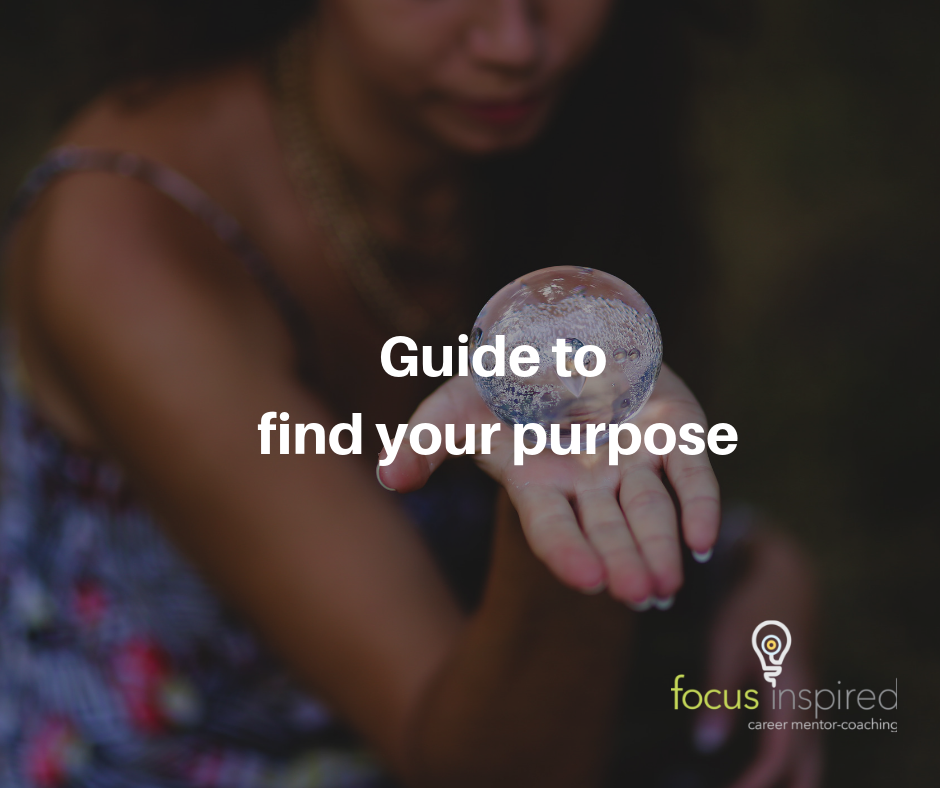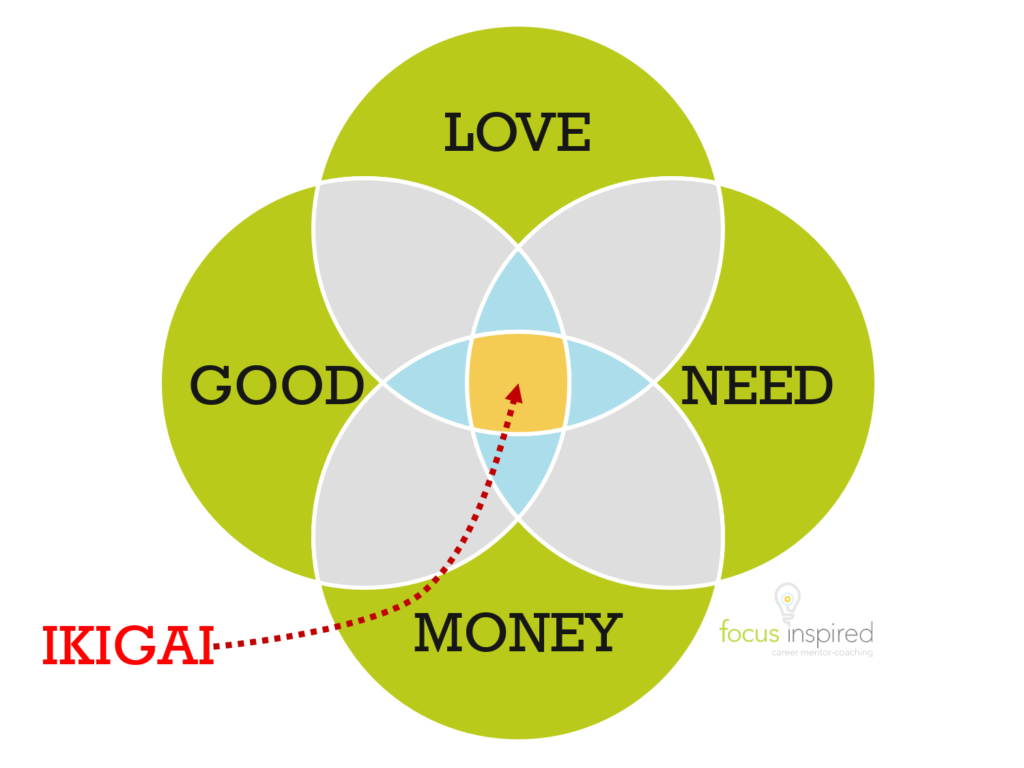
Guide to finding your purpose
Many people seem to be obsessed with finding their purpose. Their “why”? Why? Supposedly because if you’ve found your purpose and are following your passion then you’ll live a more fulfilled and happy life. That may be true, and we’ll save that clarification and debate for another post. Along with other discussions like the difference between purpose and passion.
If you agree that it is important to find your purpose, the question now becomes, how? How do you find your purpose? My opinion is that you do not actually follow your purpose. You create your purpose.
I like to use the concept of Ikigai to help provide a sequential set of steps.
Ikigai
The Japanese term roughly translated to “the reason why you gets up in the morning”. The French equivalent would be “raison d’être”. English, it would be your purpose. To understand ikigai, take 4 circles and overlap them onto a central point. Once circle representing what you love doing, you’re good at, what the world values, and the last on what the world will pay for. Where all 4 circles touch, that is where your ikigai lives.

Start with love
The one sure-fire way I’ve seen to find your purpose is to start at the top in the circle that deals with what you love. Take a look at the things you do and find what you love. Do that. When you start with something you love, you tend to want to do more of it. And when you do more of it, then you tend to get good at it. If instead, you start with something else, let’s say one of the buzzwords of the day. Bitcoin, AI, forex, digital marketing, or whatever is hot at the moment, when things get tough then you might question yourself. You might even stop. If you’re lucky you might hit an opportunity. For the most part, there will be some challenges along the way. Now if you love it anyway, you’ll do it anyway. It won’t even seem like work.
There are some of you that are saying: “What if I don’t love anything?”. Well then are there things you like? Out of those, what do you REALLY like? If you don’t particularly like anything, what are you curious about? interested in? what excites you? If you’re not curious about anything, nor interested, nor excited, then just pick something. While doing that thing, find what you love about it. Do more of whatever parts of it that you love. If there are things you don’t particularly like, see how you can minimize what drains you. You might find that as you do more of what you like, that curiosity expands to and more interest. That interest grows to the excitement. And perhaps that excitement evolves into a fullblown passion!
And what if it doesn’t? If you find that after 2 or 3 times, it’s just bleh, then perhaps move to the next thing. Be sure to make some notes about any parts that might have been interesting and see if you can find more of that in the next thing. You might be asking yourself, well isn’t this a bit haphazard? Aren’t I wasting my time just finding things I don’t like doing? Perhaps. Another perspective could be that if you’re living a life where all you are doing are things that you are curious about, that interest you and that excite you, that doesn’t sound like a bad life.
Sometimes it’s a matter of perspective. In Steve Job’s Stanford commencement speak, people often quote him saying to “do what you love”. If you listen or read the transcript, he actually says “love what you do”. Take a look at what you do, and find something to love about it. There are opportunities everywhere. Find those areas of love and grow from there!
For me, I realized that I loved self-development. I loved learning to make myself better. And I realized what I loved even more than that, is to share that information with others and get them to be better as well! Making an impact. Plus the gratitude for having helped them and put them on a better path isn’t half bad either.
Go from good to great
As you spend more time on you what you love, you’ll hopefully get better. Though, how about you don’t hope, and you purposefully get better. Learn more. There are likely books, YoutTube videos, podcasts and courses, and other resources to help you improve. Keep in mind that not all resources are created equal so make sure you do a little due diligence on who is providing you with the information. There are lots of folks out there looking to make a quick buck. There is lots of free information out there. At the same time, you might benefit from investing some money on yourself. Think about it, if you were to spend $0 on a course, what’s the likelihood you’ d finish it? However, if you spent $500 on the course, what’s the likelihood you’d finish it? Exactly.
As you improve, reflect on the progress you’ve made. Where am I getting things wrong? Make some “deliberate” practice to improve. What’s deliberate practice? Malcolm Gladwell’s popularized the 10,000-hour rule, whose premise is that people can become world-class at something with 10,000 hours worth of practice. The caveat is that the type of practice matters. Effective practice is not about simply doing things over and over again, it’s about doing it over again with the purpose of improving.
If you were looking to become world-class in tennis, you wouldn’t just spend 10,000 hours hitting a ball against a wall. You’d spend lots of deliberate practice working to improve your serve, to master your forehand, to properly add spin on your backhand, and all of the other components that make up a great tennis game.
And you want to be great at what you do. People pay a premium for great. They don’t tend to do so for good. Become world-class. You might be asking “how could I be the best in the world? there are so many people that started before and have way more resources and experience than I do.” That may be true. And, that doesn’t mean you have to be the best in the world. It does mean that you should be the best in your world. Be the best however small or large of a market you can manage. Specialization can help. A GP (general practitioner) doctor makes a good amount of money. A highly specialized neuro-surgeon makes more.
You might be asking “wouldn’t specializing restrict me?” Perhaps. Often times, being great in a small niche will allow you to translate that reputation into other things. If you were to get 0.1% of a market of 1,000,000 people to use your product or service, that’s 1,000 people and that’s good. Getting 100% of a market of 1,000 people would be better and great. Those 1,000 will be your best fans and influence those around them in other niches. The interesting part is that you’ll find that your specialization in one thing, will start translating to other things. Start with a specialty then expand. And be just as great with those! Note that it doesn’t mean you have to be good at everything. Go back to the love part. Expand into areas where you still feel the love.
Look to add value
Now that you’ve taken something you love and in the process of getting great at it, look to add value to people. How? See what problems you can solve with your skills. If you’re on the entrepreneurial side, you can look to create a product or service of your own. If you’re not entrepreneurial and would rather have a job, then which companies and roles would most benefit from your skill and experience?
How are you adding that value? Often times value is provided in exchange for the utility of time or status. Does your product do something for them that means they have more time for other things? Say you’re looking to buy a $5 or a $50 steak knife. You could just bite and chew the meat. Though that isn’t perceived as civilized so you want a knife. Would you need $50 knife or would a $5 knife be sufficient? Maybe the $50 knife is sharper, so you can cut faster and stays sharper longer (time). Or maybe it’s more elegantly designed and looks better (status).
And for you, what value of time or status can you provide? You can look up and research all sorts of medical terminology and spend years practicing your diagnoses. Or you could go to your doctor who has done that learning and practice for you. You could learn about engines and car parts and maintain your vehicle yourself. or you could go to a mechanic.
Keep in mind that the world is competitive. There are likely other people that can do what you do. So how do you do it differently? How do you do it better? Going back to the value part, you don’t necessarily have to be the best in the world, you should, however, be the best in the world of options that your potential customers have access to.
Value to money
When you add value, then money follows. If you think about it, money is an embodiment of perceived value. Perceived as sometimes the tangible materials in things may not seem to be worth that much, but someone perceives it to be so. If you think about most art, the canvas and paint probably didn’t cost that much. And yet, someone may be willing to hundreds, thousands, even millions for a piece of art!
Unfortunately, that perception is relative and individual. What you deem to be valuable, others may not. And in this day and age, materialism tends to have more perceived value than other things. Take the non-profit world for example. They provide lots of value to the folks they support. Though their work isn’t perceived as having the same value for many. Would you rather get a new BMW? or get a Honda and use the difference to support starving children in Africa? Or develop a cure for a disease? Or some other cause? Many people choose their materialism. Another example closer to home for me are teachers. In most places, teachers would get good pay. However, if you think of how much responsibility and impact that a teacher could have on all or even one of their students, I would argue they should be paid much more. Although going back to the “good” section, I would argue that the GREAT teachers should be paid more.
"In life, you get paid in two things: experience and money. Take the experience first and the money will come" -unknown
Create your purpose
Your purpose starts with you investing the time. Taking the time to pursue what you love. Taking the time to become great at what you love. Taking the time to find who would get value from what you love and you’re becoming even great at. And taking the time to ask for compensation for adding that value from what you love that you are becoming even great at.
- Start with something you love to do
- Become good then great at it
- Find would get value from what you do
- Ask for compensation (money) for the value provided
- Have a fulfilled and purposeful life!
"The purpose of life is a life of purpose" -Robert Byrne "The purpose of life is to live life purposefully" -unknown
Need help with finding and creating your purpose? Let’s chat on how I could help luki@focusinspired.com
Also published on Medium.
Follow:Share: